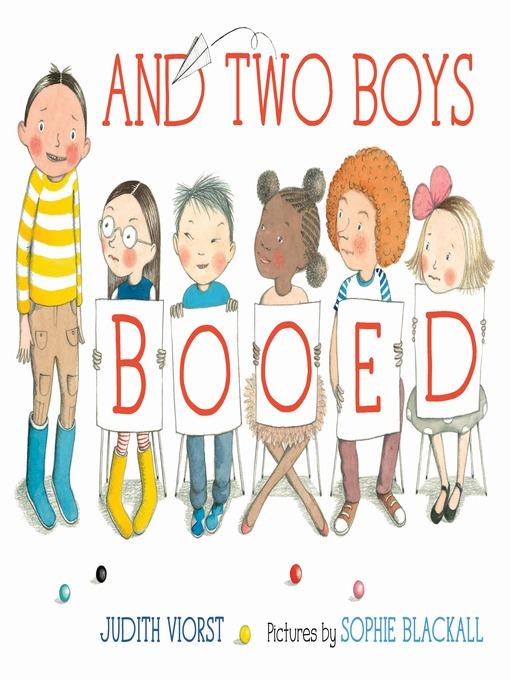
And Two Boys Booed
فرمت کتاب
ebook
تاریخ انتشار
2014
Reading Level
2
ATOS
3.8
Interest Level
K-3(LG)
نویسنده
Sophie Blackallشابک
9781466875432
کتاب های مرتبط
- اطلاعات
- نقد و بررسی
- دیدگاه کاربران
نقد و بررسی

Starred review from June 23, 2014
It was an inspiration to pair Viorst and Blackall in this funny, ingenious, and true-to-life story about stage fright. It’s the morning of the class talent show, and the narrator couldn’t be more ready; lifting the first of several small flaps, readers can see the boy beaming under his bedcovers. But with five kids ahead of him in the talent lineup, there’s a lot of time for nerves to build, and by the time the boy stands to sing, performance anxiety and some mild heckling turns to his brain to soup: What exactly was his talent, again? On five consecutive flaps, a series of improbable talent mashups swirl around the boy’s head (“I started walking my poem. I mean, I started dancing my hands”), making palpable both the boy’s discombobulation and the sense of eternity that’s a signature feature of embarrassing moments. Finally, he just opens his mouth and... sings. Cue the applause. Because as Viorst knows better than anyone, sometimes what seems awful or terrible really isn’t the end of the world. Ages 4–8. Illustrator’s agent: Nancy Gallt, Nancy Gallt Literary Agency.

July 15, 2014
A boy waits with increasing trepidation for his turn in the class talent show in this cumulative story.He's diligently practiced his song "a billion times" and wears his "lucky blue boots" and pants "with cool pockets." (Blackall's appealing illustrations cleverly incorporate flaps: Kids can check out the teeming contents of one of those pockets.) As, in succession, Chloe reads her poem, Henry walks on his hands, Georgia dances on her toes, Leo juggles, and Madeleine shows off her paintings, the young narrator grows ever more discombobulated, seeming to disappear into his yellow-striped sweater. He begins mixing up words: "On the talent of the morning show, I was ready to song my sing." Uncertain as his turn arrives, he gets up and sits down repeatedly. Five double-page spreads depict his imagination's chaotic fantasy, as he mentally mixes up talent-show props and activities and begins "walking my poem" and "dancing my hands." Blackall clearly separates the realistic and fantasy elements-for the latter, she gives the boy blue pants and khaki-colored boots with pockets. When he finally manages to sing his song, "[t]wo boys booed. / But all the other kids were clapping!" The multiethnic classroom is adeptly managed by a sanguine teacher who keeps those two impish boys close by.Viorst ably returns to the familiar trope of vanquishing childhood fears, nicely abetted by the talented Blackall. (Picture book. 4-7)
COPYRIGHT(2014) Kirkus Reviews, ALL RIGHTS RESERVED.

August 1, 2014
Gr 1-3-"On the morning of the talent show, I was ready to sing my song." Lift the flap and see the charming narrator toss back the bedcovers with a smile. Using a cumulative story structure, he recounts the events of the big day, until something bad happened-when he sang his song, two boys booed. Telling this part of the story, he mixes up the words of the cumulative tale, and each spread shows a lift-the-flap version of the silly word combination: "I kept changing my mind about songing my sing. I started walking my poem." Although the boos momentarily throw the narrator off his stride, the rest of the class cheers enthusiastically. There is no resolution or consequence to the booing, but in life it's impossible to please everyone, and the real lesson is in finding satisfaction with doing your best. A final flap causes the boy to bow, and on the endpages he is happily singing his song. Characters emotions are clearly portrayed through body language and facial expression. As he gradually succumbs to stage fright, the narrator tries to make himself disappear by shrinking inside his clothing. From page to page, kids in the audience fidget, play with each other's hair, distract others, and whisper-giving real authenticity to the tale. This is a good school story with clever art. Clearly both author and illustrator had fun creating it, and students will have no trouble enjoying it.-Anna Haase Krueger, Ramsey County Library, MN
Copyright 2014 School Library Journal, LLC Used with permission.

September 15, 2014
Grades 1-3 A little boy tries to convince himself that he is ready to sing his song in the class talent show. He prepares and prepares, but as the sixth and final child to perform, his confidence wanes as his turn approaches. When the time arrives, he seems to panic, but in the end, he pulls things together and performs. Though two boys do indeed boo, everyone else cheers, and all is well. Viorst communicates the turmoil and the resolution in innovative ways, using cumulative language to build suspense and jumbling words to convey our protagonist's panic when the big moment arrives: I was ready to song my sing. Blackall follows suit, judiciously employing flaps to emphasize key words and illustrating the climax in a series of surreal imaginings built of the boy's mixed-up turns of phrase. The result is an abstracted, expressive exploration of apprehension, made accessible with careful language and thoughtful imagery.(Reprinted with permission of Booklist, copyright 2014, American Library Association.)

























دیدگاه کاربران